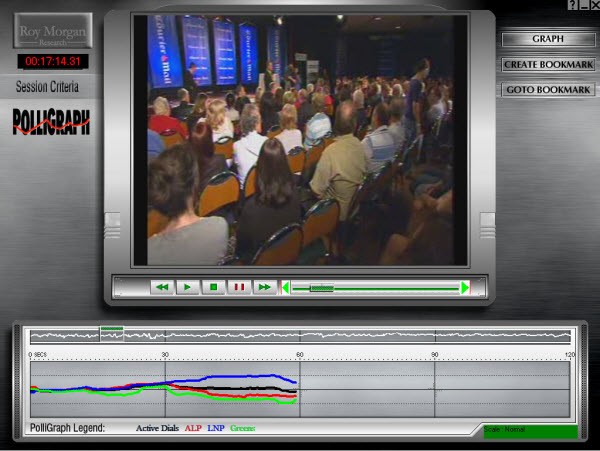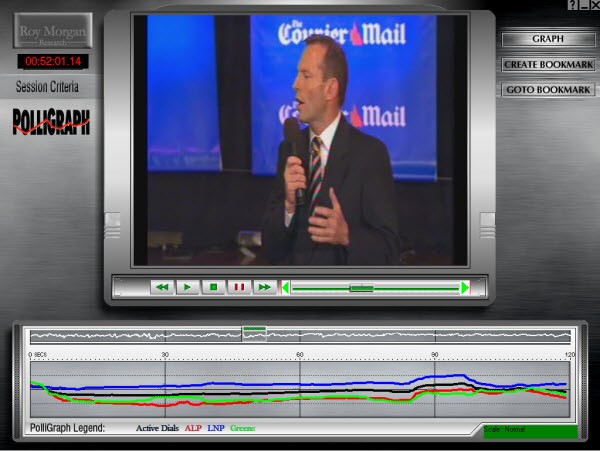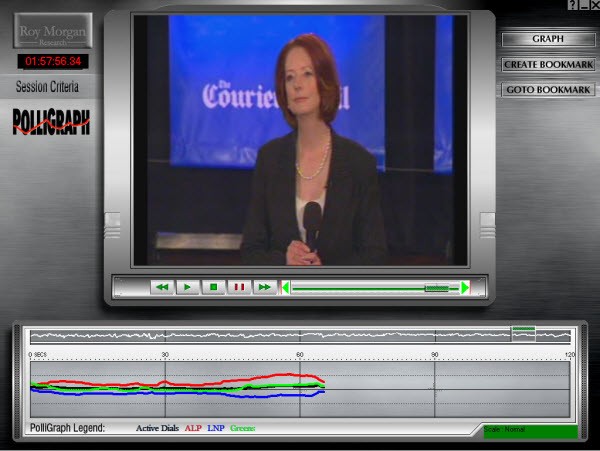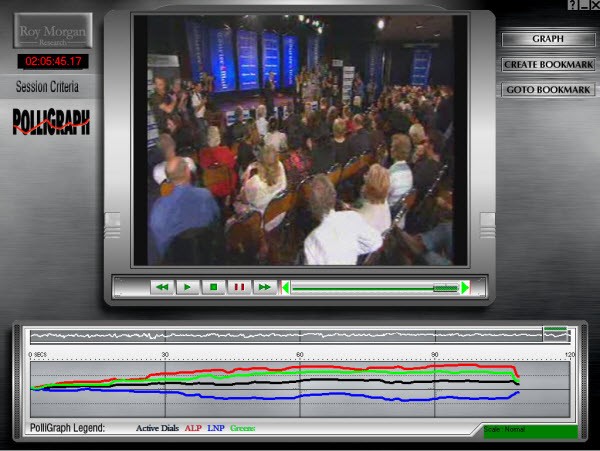At Brisbane’s People’s Forum this week — the leaders’ debate that wasn’t a debate — Julia Gillard emerged as the narrow winner at 83-75 on the vote out the door. But how did voters see the leaders perform during the debate itself, particular when hot topics like gay marriage, broadband and boat people were raised?
Crikey has the Roy Morgan PolliGraph results, conducted ‘live’ in Seven Melbourne’s studios with a balanced audience of 80 voters — 30 were intending to vote Labor, 30 were intending to vote L-NP and 20 were undecided or intending to vote for other parties.
They were also balanced to be equally male and female in each group with an equal split between our three age ranges.
The audience do not push buttons to rate the speakers on a scale of 1 to 10 (which requires you to think about it and to look down to find the right button). Instead, The PolliGraph is a dial which respondents turn continuously, almost unconsciously, rating their positive or negative feelings between 1 and 100.
The graphs represent the average score (or the average of a selected segment of the audience) on the 0 – 100 scale.
First a look at Abbott, who was asked a question on gay marriage: “Mixed racial marriage used to be considered immoral and was illegal in some countries. Do you see the parallel between this and your stance on gay marriage, which 30 countries in the world now consider a basic right?”
Abbott replied:
“Look, I don’t think there’s a parallel and I can fully understand why gay people feel that they’ve been ripped off over the years, because there has certainly been lots of discrimination against gay people over the years and I am as strong as anyone to want to see everyone given the rights and the dignity that every single human being regardless of race, religion, colour, creed, nationality, gender, sexuality should be accorded. But I do think, I’m sorry, I will be a disappointment, I do think that marriage by definition is between a man and a woman. That’s not to say that men and women who are married love each other more than other people in other sorts of relationships, but I just think that the marriage relationship is between a man and a woman.”
The PolliGraph saw an initial rise across the board, quickly followed by a drop in Greens and ALP voters, and a continued rise from LNP supporters.

Broadband is another hot button issue in this election and The Polligraph reacted accordingly. >Abbott was asked about the Coalition’s broadband plan: “In 2010, most people do have a computer, they use a computer. They use it for social networking, business and a lot of other things. Do you really think that our network at the moment is up to it and what are you going to do to make sure that it does cope with the growing use that it’s going to get in the next 20 years?”
Abbott replied:
“I don’t say that our network is perfect but I’m not sure, in fact I am certain, that spending $43 billion on just one technology is not the way to go. For instance we can spend $43 billion, $5,000 per household, building fibre to the home but what about all those people that use their computers away from their home? Why should they be chained to a fibre cable? I mean, how old fashioned is that, to say that you’ve got to be plugged into a wall somewhere if you want to get access to fast broadband services? Now, we think that you can do just as well for a lot less and that’s what our policy proposes. It’s not a cheapskate policy. It’s still going to cost $6 billion so it’s very expensive but what we’re spending is roughly in line with what’s been spent by countries like New Zealand and South Korea, that all the experts say have a very good broadband plan. We want to see competitive markets here, not just government monopoly because we believe, based on the evidence, that comparative markets nearly always give you a better outcome than government monopoly and the other thing that I just want to leave you with is this, the Government is boasting about how fantastic their broadband vision is, what about this internet filter? I mean, come on. I mean, these are the people who say they believe in broadband, they believe in online services and they want to whack a filter on everything. I mean, how much is that going to slow down the internet?”
But moderator David Speers quizzed Abbott further on broadband, asking “Do you acknowledge that there are things that you can do with fibre optics at home, at work, at the doctor’s, that you can’t do with wireless?”
“Well, you can’t at the moment. Now, that doesn’t mean that you’re not going to be able to in the future. I’m not against fibre. I really am not against fibre and there will be more fibre under our system but I don’t think we should put all our eggs in the high-speed fibre basket which is what the Government’s doing.”
This was The PolliGraph’s reaction:

Abbott seemed to impress the LNP vote, but ALP and Greens supporters were unenthusiastic, though there was a small jump in Greens support around the 30 second mark. Note the increase across the board around the 80 seconds, presumably in response to David Speers’ question.
Gillard was also grilled on boat people and asylum seekers, with one voter asking “Why did you allow the Member for Lindsay to accompany you on your patrol boat excursion, and don’t you see this as manipulative politics playing on the insecurities of xenophobia, and how do you expect the Australian people to view your leadership through integrity in the future?”
Gillard replied:
“Look my simple view about that was I did go and have a look at our patrol boats that work from Darwin and work in our northern waters. We’ve actually got, you know, more assets patrolling our borders than we’ve ever had before – more days in the air, in the sea patrolling the borders. They do fantastic work. I wanted to go have a look at that. And I know for David Bradbury, he’s been saying for a long period of time now as the representative of his community in western Sydney, that people are really concerned; people are a bit fearful; they’re worried. And so I thought it would help for him to say, well look, I’ve gone and seen it firsthand. And then to be in his community explaining to people, you know, you might have this vision that somehow there’s, you know, no protection for our borders, or something like that; it’s simply not true, I’ve been there and I’ve seen it myself. So that was the motivation for him to come along with me to Darwin. Understand people may have seen different interpretations in that but that was my motivation in doing it.”
How did the PolliGraph react?
 Here we see a very slight drop by LNP voters and an increase in ALP, particularly toward the end. But the Greens appear neutral on this issue, neither overly supporting Gillard’s stance nor expressing dislike at it.
Here we see a very slight drop by LNP voters and an increase in ALP, particularly toward the end. But the Greens appear neutral on this issue, neither overly supporting Gillard’s stance nor expressing dislike at it.
When it came to closing statements, Abbott — who went first — gave a brief take on how much he would fight in this campaign:
“I think that our political process is much enhanced by gatherings like this. I think we’ve had a candid exchange. Some of you, obviously, don’t think that much of me. That’s your right and I’ve had a chance to do my best, to put my best foot forward to you.
This campaign has got just two days to go and I am going to campaign continuously over the next two days because I know that the Australian public do not lightly change the government. I know that you do not lightly entrust the Prime Ministership to someone else. You need to know that I want it and I do and you need to know that I will work for it, and I will. So starting at 7am tomorrow morning, it’s a continuous campaign, right through until Friday night, because I want to meet as many Australians as I possibly can. I want the Australian people to know that I am ready to govern. That’s what I intend to demonstrate over the next 72 hours.”
The PolliGraph seemed to take this policy-light closing statement well across the board, even seeing support from Greens and ALP voters when Abbott admitted that not everyone likes him:

Alternatively, Gillard’s closing statement attempted to sum up the key aspects of her campaign: the economy, jobs, healthcare, the NBN:
“…what this election is about is what matters to you and your family. And all I’m asking people to do is when they’re thinking about voting, Friday night when they’re doing that final stocktake – how am I going to vote on Saturday – I would ask you to think about the following things. What’s better for me and my job? … And when you’re in that job, I want you to have the benefit of decent working conditions. … I’ve got a personal passion for making sure every child gets a great education. I won’t rest until I achieve that, and many of the policies I’ve announced in this campaign are exactly about that. I believe we need better health care, we’ve got to keep investing, we need the Federal Government to step up to the plate to put in more money. I will do that. I don’t want us to go back to the days of Mr Abbott’s cut backs. And I do want to see us go forward into the future with courage and conviction, not be afraid of it. We should have the national broadband; we should keep pace with the rest of the world. I will build it, Mr Abbott will not. We should tackle climate change. We haven’t talked about that much tonight but I am absolutely convinced we can do it together. These are the big issues in the election on Saturday. All I ask of you is that you have a think about them before you go and vote.
The PollieGraph saw a much bigger split along party lines for Gillard’s closing statement, with a significantly high jump by ALP and Greens supporters:









If you want to have same-sex marriage in Australia, you’ll have to change the government. As reported by Paul Kelly and Dennis Shanahan this morning:
“Ms Gillard told The Australian there was a substantive basis to her rejection of same-sex marriage. She now rules out any change in her opposition to same-sex marriage during the life of her government. She said she appreciated ‘our heritage as a Christian country’ and believed ‘the marriage act has a special status in our culture’.”
It is hard to know whether she is just a hypocrite, a homophobe, a coward, or all three. However, our atheist prime minister, despite thumbing her nose at the Church by living in sin, is more afraid of right-wing Christian voters than homosexual voters. There will be no same-sex marriage under a Gillard Government. Therefore, if you want to see gay marriage in Australia, you’ll need to vote for one of the minor parties which support it, and you’ll need to send Labor to the sin bin of Opposition where they might contemplate a change of leader and a change to their policy prior to winning their next stint in government.
@JOHN……get a life!
Yeah John. What’s your problem? You can sit on the bus already – stop whinging about having to sit down the back. Find something important to worry about. You have plenty of rights.
/sarcasm.
Regardless of Julia Gillard’s personal opinion of gay marriage there are many people in the Labor Party as well as out there in voter land who believe that being gay is either unnatural or a lifestyle choice.
A great deal has been done by the State to give same-sex partners the same rights and recognition as heterosexual partners.
Julia’s reasons for not marrying her partner do not concern us but is her relationship with her partner of greater or lesser standing that of homosexual partners?
She is a team player as well as a leader and will not initiate an unwinable war that will tear the country apart over “marriage” when she doesn’t regard it as necessary to her own partnership.
The problem is that when homosexual relationships are discussed, the heterosexuals go into paroxysms of visualisations of what “they” actually do in bed. Either they are repelled, or think they must vociferously claim to be, for fear of being thought to be homosexual and having others thinking lewd thoughts about their bedroom activities.